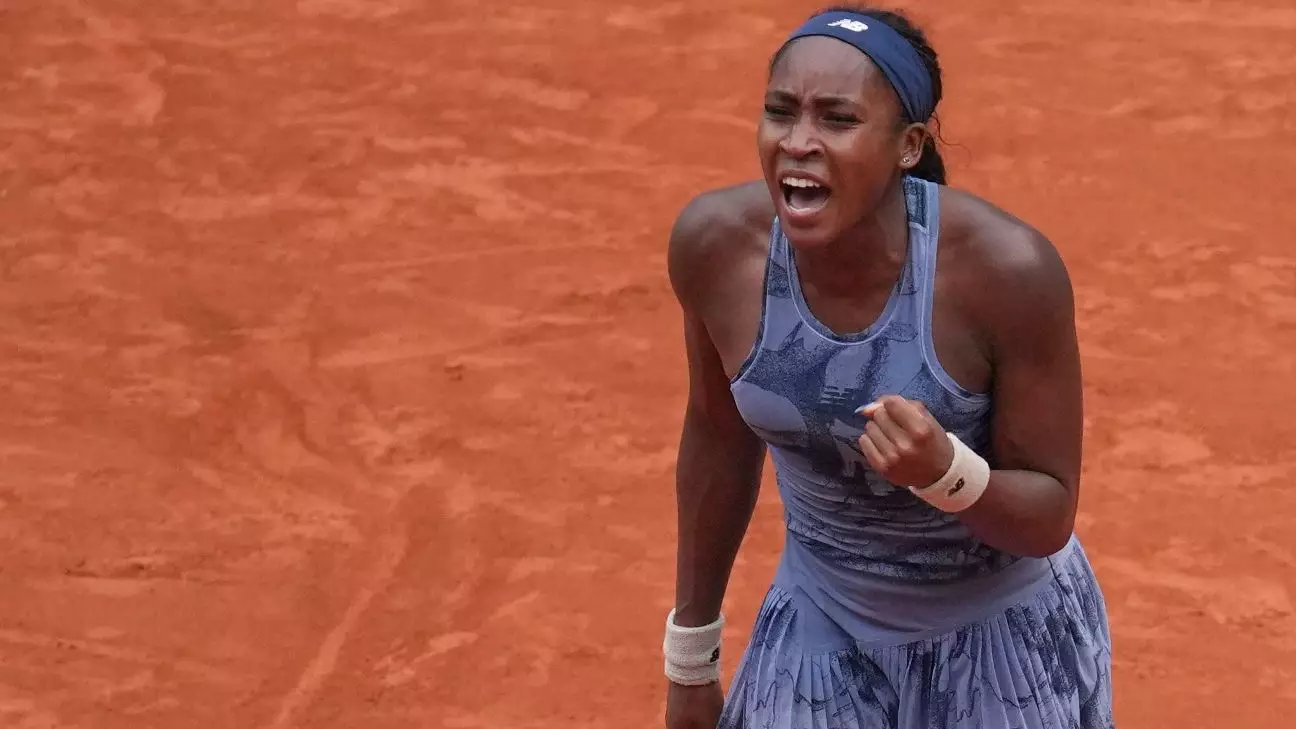Coco Gauff’s performance in the third round of the French Open was a display of explosive energy and remarkable skill. Within the first 10 minutes of her match against Marie Bouzkova, she seized a commanding 3-0 lead, showcasing her aggressive playstyle and fierce competitive spirit. The opening set appeared effortless; Gauff deftly maneuvered around the court, utilizing her speed and precision to impose her game on Bouzkova. This rapid start offered a glimpse into why Gauff is widely regarded as a rising star in women’s tennis.
Yet, as the match progressed, the landscape shifted dramatically. It is here that the complexities of competitive sports emerged, illuminating a reality that often eludes casual spectators: the psychological challenges that accompany success. Gauff, who had previously shown such dominance, found herself on the brink of losing control of the second set.
From Confidence to Crisis
After an initial onslaught, Gauff’s game took a notable dip. While she had dominated the first set, the second became a different narrative entirely. She narrowly avoided defeat, recovering from a precarious position where Bouzkova led 5-3 with a serve that could have easily sealed Gauff’s fate. The match’s momentum swung wildly, showcasing the unpredictable nature of tennis. Here lies the essence of Gauff’s journey — a testament to her resilience in the face of adversity.
In her own words, Gauff acknowledged the need for improvement: “Obviously, I can do some things better.” This self-awareness reveals her maturity, a trait that resonates deeply in an athlete so young. At just 21, Gauff embodies the balance between confidence and humility, crucial components for growth in any sport.
A Momentum Shift
The pivotal moment of the second set came when Gauff turned a potential crisis into an opportunity for a comeback. By refusing to allow Bouzkova to string together points, she demonstrated not only physical prowess but an essential mental fortitude. Gauff’s remarkable court coverage and relentless pursuit of the ball eventually led to a surge of winners that turned the tide in her favor. The statistic is telling: she managed to record more than double the number of winners compared to Bouzkova in the second set—22 to 11.
This transformation was underscored by Gauff’s tactical adjustments, particularly with her serving strategy. As she herself noted, her aggressive serving in the first set had created more opportunities for easy holds, yet she recognized a shift to passivity in the second. It’s a clear reminder of the mental game that underpins tennis at the highest levels: the importance of maintaining an aggressive mindset in order to dictate the flow of the match.
The Road Ahead and Rising Stakes
Ahead of her next matchup against No. 20 Ekaterina Alexandrova, Gauff moves deeper into the tournament with not just ambition, but a palpable sense of determination. She is not just competing for herself but represents a broader American contingent of players in the fourth round, showcasing the depth of talent within U.S. women’s tennis. Each stride further into the tournament increases the stakes, both personally and nationally.
With fellow compatriots like Jessica Pegula and Madison Keys also advancing, the spirit of competition transforms into an exhilarating team dynamic. Each player contributes to a growing narrative of American resilience on the international tennis stage, fostering a burgeoning sense of camaraderie and expectation.
While Gauff’s next challenge looms large, her ability to turn setbacks into strengths could ultimately be her greatest asset. Spectators and analysts alike will watch closely, anticipating how this talented young athlete will navigate the pressures of elite-level tennis and whether she can summon the tenacity required to reach a new level of achievement at Roland-Garros. The match against Alexandrova promises to be a thrilling encounter, and Gauff’s journey is one that inspires hope and excitement—both for herself and for the future of American tennis.

